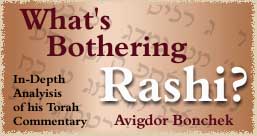

Back to this week's Parsha | Previous Issues
Shabbat Succot
Last week we asked about the Rashi on Deuteronomy 32:31 "For not as our Rock is their rock - yet our enemies judge us." RASHI "All of this the enemies should have understood, that is was Hashem who delivered them (the Israelites) into their hands and the victory is neither theirs nor their god's, because until now their gods could achieve nothing against our Rock. 'for not as our Rock is their rock.' The word "tzur" in the Scriptures always means rock." Rashi explains the flow of the verse. But then he adds the meaning of the Hebrew word "tzur." This is very strange. Thos word appears severakl times in the Torah before this. And it appear five times in this sedra alone before this verse. Why did Rashi wait until now to tell us its meaning? Think. Review the other verses and compare them with our verse. An Answer: Perhaps you noticed that every time the word "Tzur" appeared until now, in this sedra, it referred to Hashem. This is significant. Rashi tells us that this word means "rock." What else could it possibly mean? the answer is it might mean "creator" from the word "yotzer." As Rashi quotes in parashas Bereishis (Genesis ) "Ki v'ya Hashem zur olamim." "With the letters "yod" and "heh" He created ('tzur') worlds." Thus Rashi is careful to tell us here (and not before) when the word "tzur" refers also to an alien god we must be aware that the p'shat (and not midrashic) meaning of the word 'tzur' is "rock' and not 'creator.' Before this verse, when the word 'tzur' refered to Hashem it wasn't so important if the student thought this word meant 'creator,' since in fact it referred to Hashem and He is the Craetor. So rashi did nort clarify its true meaning in earlier verses. Now to the Torah reading on Shabbat Shmini Atzeres (we'll take a vacation for the first day.)
SUCCOSDeutoronomy 16:15 "Seven days you are to celebrate for Hashem your G-d in the place that Hashem will choose; for Hashem will bless you in all your produce and in all your endeavors. And you shall experience pure joy." ("v'hayis ach somayach.")
RASHI "According to its plain meaning, this is not a command but an assurance. According to the Talmudic teaching, however, it is derived from here to include the last evening of the festival in the mitzvah of rejoicing." Questioning Rashi We know that the word "ach" ("but") in Hebrew always excludes something. How is that here this word INCLUDES the last day of the festival? Your Answer. After the chag, IY"H we will suggest an answer. In the meantime, we wish you a CHAG SOMAYACH.
Back to this week's Parsha | Previous Issues Permission is granted to redistribute electronically or on paper, provided that this notice is included intact.
For information on subscriptions, archives, and
http://www.shemayisrael.co.il |